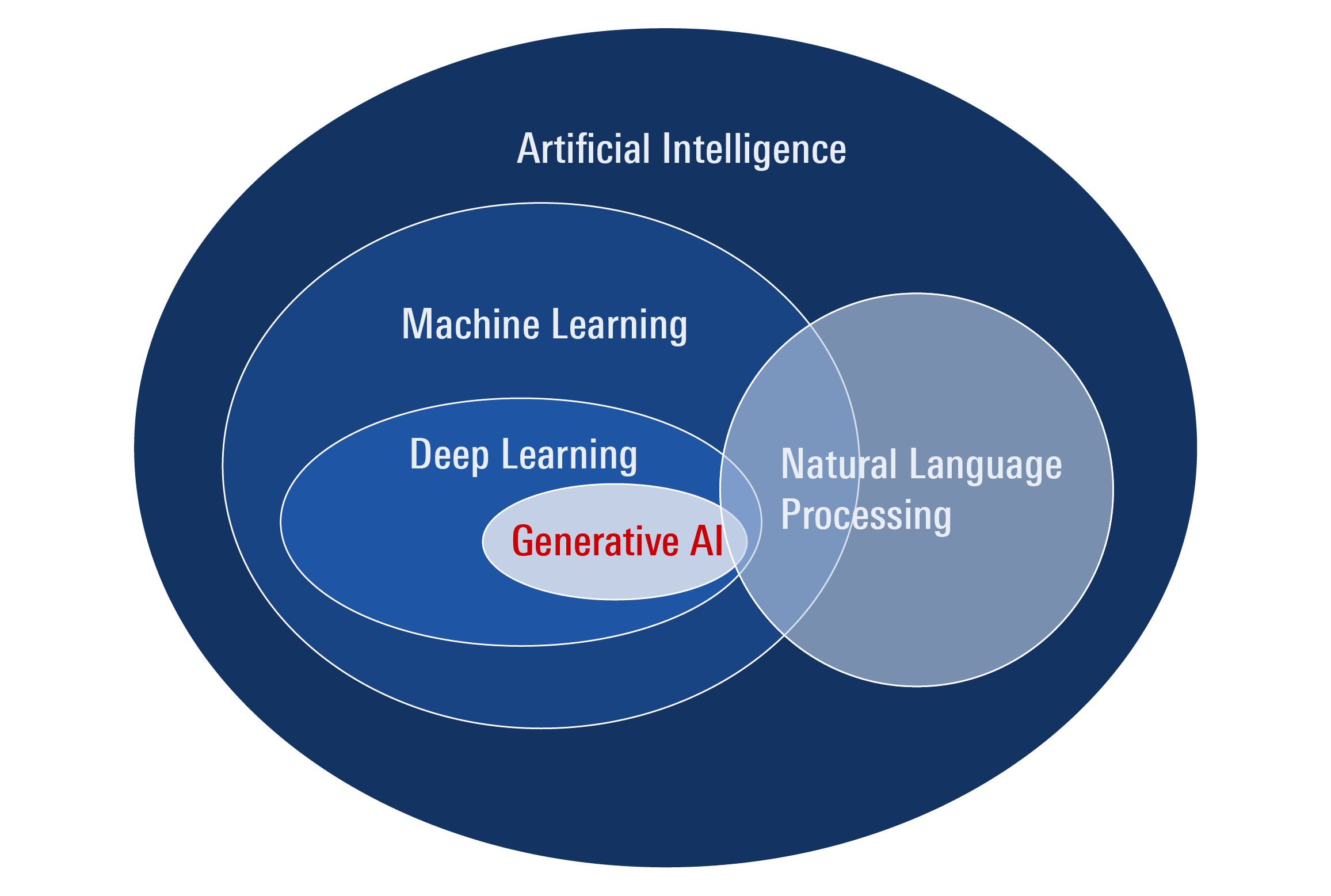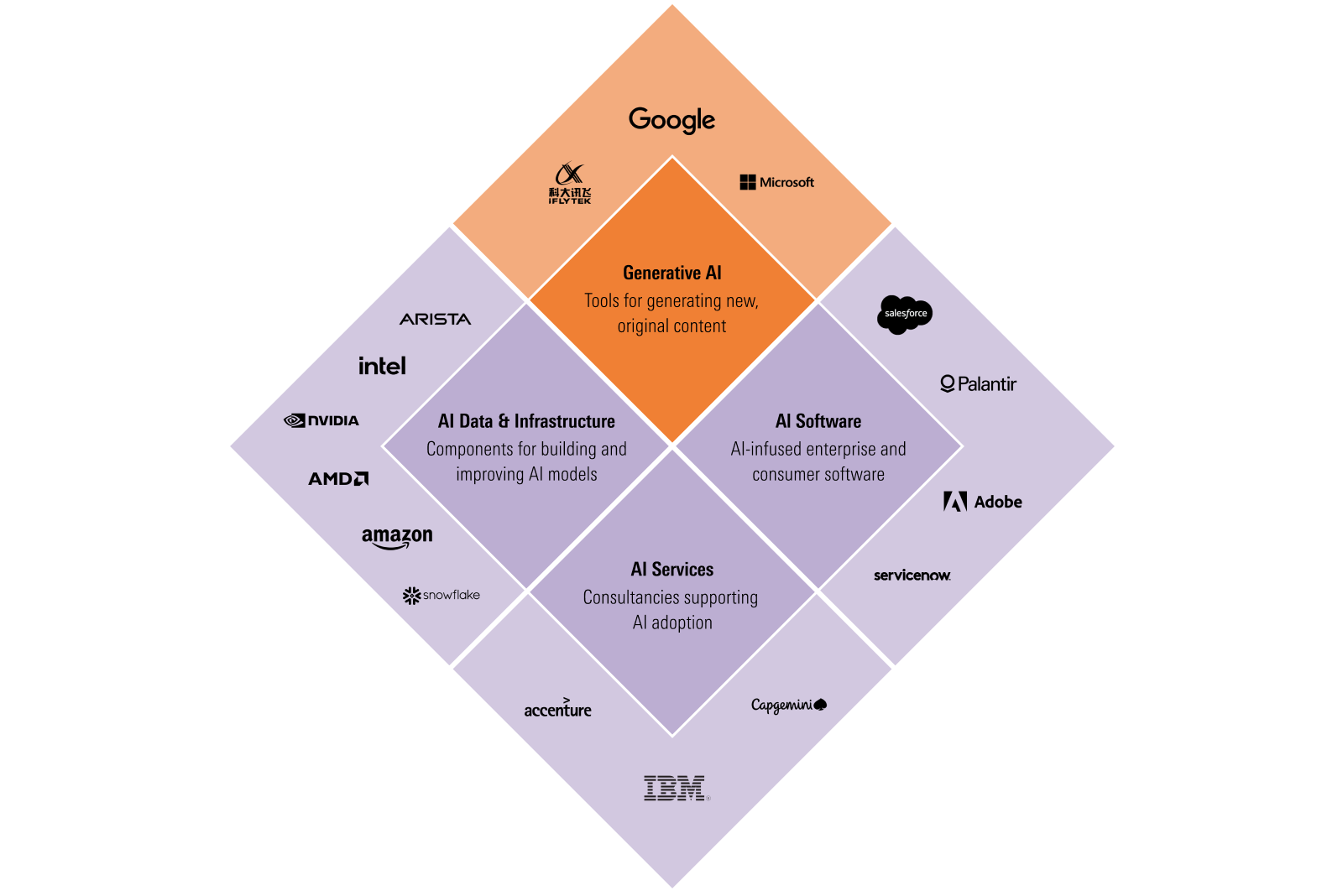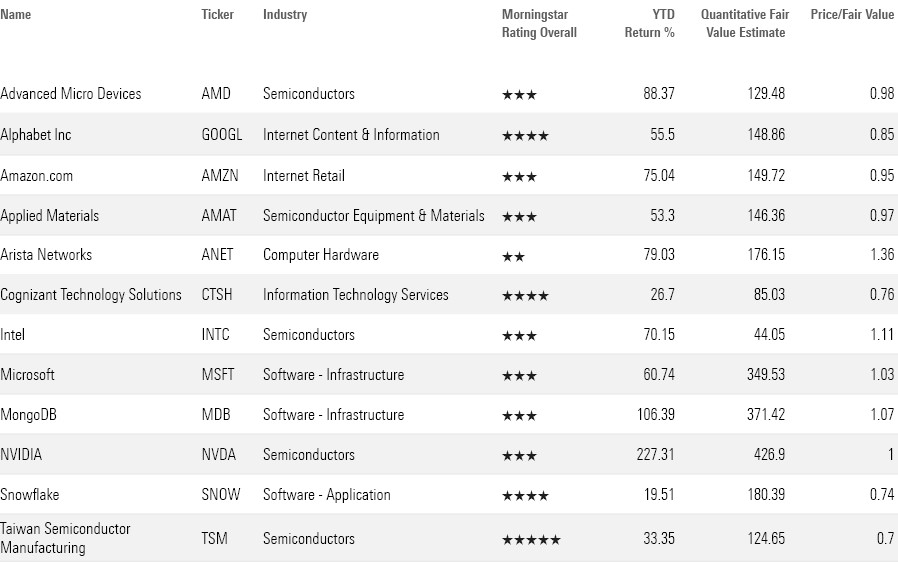7 Charts On the AI Stock Boom One Year After ChatGPT’s Launch
These stocks and the key trends behind them are critical for understanding the AI investment landscape.

When ChatGPT launched one year ago, it was more than the latest cool new online tool. It transformed the discussion around artificial intelligence, or AI, and set off a frenzy among investors looking for the stocks that stand to benefit the most from the widespread adoption of such tools.
Some observers believe ChatGPT—released to the public on Nov. 30, 2022, by its creators at OpenAI—may be as transformative as the adoption of the internet, but concentrated within a single product, much like how the iPhone reshaped not just the market for mobile phones but also countless applications, business models, and everyday life.
Semiconductor chip designer Nvidia NVDA has been the poster child for the AI boom. The company’s stock has surged over 200% in the past 12 months, driven by its dominance of the market for the chips most suited to the data centers that make AI possible.
More broadly, the Morningstar Global Next Generation Artificial Intelligence Index has gained roughly 68% in 2023, more than 3 times the rally seen in the broader market.
Salesforce Stock Price
What Is ChatGPT, and Why Does It Matter?
ChatGPT didn’t spring from nowhere. The underlying technology falls under the broad umbrella of artificial intelligence, a concept that has been around for decades. The tool is what’s known as generative AI, meaning it learns how to respond to prompts and generate text or images. Generative AI opens the door for significant efficiency improvements across a wide variety of industries and society at large. (And also raises concerns about its misuse and dangers.)
The Artificial Intelligence Landscape

“This market exploded in 2023 with increasing investment in generative AI, and we don’t see it slowing down any time soon,” says Morningstar technology sector director Brian Colello.
AI is still in its infancy as a business tool, and there is an entire food chain beyond semiconductor companies like Nvidia and Taiwan Semiconductor Manufacturing TSM that also stand to gain from its expansion in the years to come. These include chip equipment vendor Applied Materials AMAT and data center infrastructure companies such as Arista Networks ANET.
A wide range of companies are beginning to integrate AI into their products. Salesforce CRM has employed AI since 2016. Microsoft MSFT now incorporates its chatbot Copilot into its widely used Microsoft 365 software. Colello notes that some, like Wendy’s WEN and Walmart WMT, are using AI directly with retail customers.
To help investors navigate the AI space, Morningstar analysts have broken it down into four broad themes: generative AI, AI data and infrastructure, AI software, and AI Services.
AI Investment Themes and Stocks

Big ideas often precede technology’s ability to make them successful and broadly accessible. To perform tasks that mimic human intelligence, computers require extremely powerful, fast, and flexible semiconductor chips—sometimes called accelerators—as well as access to tremendous amounts of information to “learn” from. The internet created a ready pool of massive amounts of information for models to scrape. Meanwhile, recent decades have seen significant advances in chip technology, most notably Nvidia’s graphics processing unit chips, which first found widespread adoption in video games.
“Cloud computing companies will need to spend on accelerators, and the chip supply chain is investing in capacity and technology to fuel massive growth,” says Colello. The boom in AI stocks came after Nvidia reported a surge in AI-related chip demand in May that blew away Wall Street’s expectations.
“An old adage suggests that the best way to profit from the gold rush across the western United States in the mid-1800s would have been to sell picks and shovels to miners, rather than betting on the miners themselves,” says Colello. “OpenAI was perhaps the first large language model firm to ‘strike gold’ in the AI gold rush, but others will likely win, and still others will fail. Meanwhile, Nvidia has reached a trillion-dollar valuation and has profited the most from the early investment in generative AI, having emerged as the dominant ‘picks and shovels’ maker.
Nvidia's Data Center Revenue Set to Explode
Colello continues: “Nvidia’s expansion into software and networking gear is as if a shovel-maker were trying to expand into boots and blue jeans too.”
While AI’s true impact on business and the world at large is years away from being realized, the biggest early winners are the firms that build the semiconductors needed for the massive amounts of calculations needed to train AI models and handle queries.
Massive Growth Ahead for AI Accelerator Revenues
The next major players may be cloud computing companies. The advent of generative AI has further fueled the rise of cloud computing, already one of the biggest recent trends in technology investing. It’s become commonplace for businesses to rent computing capacity from industry leaders such as Amazon.com AMZN through AWS, Microsoft through its Azure platform, Alphabet’s GOOGL Google Cloud, and Oracle’s ORCL Cloud.
Now it looks like cloud computing will take another significant leg higher to house the immense quantities of data needed to train and manage AI models and respond to end-user queries.
Generative AI Will Be a Key Contributor to Future Cloud-Computing Growth
All that data takes managing. On this level, others stand to benefit from AI, such as data lake companies Snowflake SNOW and MongoDB MDB. “We think the datasphere—all the data that exists in the world—will explode as a function of metadata created by AI such as ChatGPT, as well as the net new data points that need to be collected to be ingested in AI models,” says Morningstar analyst Julie Bhusal Sharma. “This is the passive case for why firms like Snowflake and MongoDB have lots of growth ahead of them, before even counting their superior technical standing.”
The Exploding Database Management Software Market
Here’s a look at some of the key AI stocks to watch across the technology sector, along with highlights from their Morningstar metrics:
AI Stocks

The author or authors do not own shares in any securities mentioned in this article. Find out about Morningstar’s editorial policies.

/s3.amazonaws.com/arc-authors/morningstar/ed529c14-e87a-417f-a91c-4cee045d88b4.jpg)
/s3.amazonaws.com/arc-authors/morningstar/ba63f047-a5cf-49a2-aa38-61ba5ba0cc9e.jpg)
/cloudfront-us-east-1.images.arcpublishing.com/morningstar/ZPLVG6CJDRCOTOCETIKVMINBWU.png)
/cloudfront-us-east-1.images.arcpublishing.com/morningstar/ZZSPP5AYAJB2RIRVFE2XR23GUQ.jpg)
/cloudfront-us-east-1.images.arcpublishing.com/morningstar/NYUEHSFI4BDCJPQZJ76HH4PKSM.jpg)
:quality(80)/s3.amazonaws.com/arc-authors/morningstar/ed529c14-e87a-417f-a91c-4cee045d88b4.jpg)
:quality(80)/s3.amazonaws.com/arc-authors/morningstar/ba63f047-a5cf-49a2-aa38-61ba5ba0cc9e.jpg)